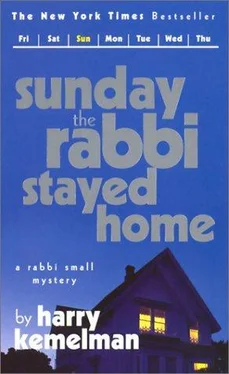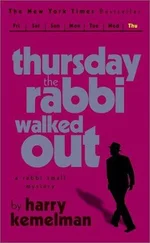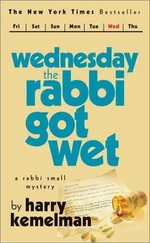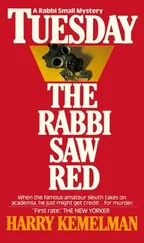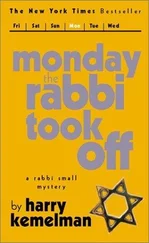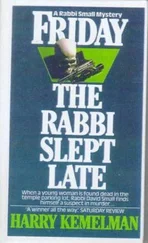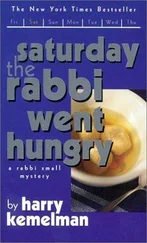Harry Kemelman - Sunday the Rabbi Stayed Home
Здесь есть возможность читать онлайн «Harry Kemelman - Sunday the Rabbi Stayed Home» весь текст электронной книги совершенно бесплатно (целиком полную версию без сокращений). В некоторых случаях можно слушать аудио, скачать через торрент в формате fb2 и присутствует краткое содержание. Город: New York, Год выпуска: 2002, ISBN: 2002, Издательство: iBooks, Жанр: Иронический детектив, на английском языке. Описание произведения, (предисловие) а так же отзывы посетителей доступны на портале библиотеки ЛибКат.
- Название:Sunday the Rabbi Stayed Home
- Автор:
- Издательство:iBooks
- Жанр:
- Год:2002
- Город:New York
- ISBN:978-0743452380
- Рейтинг книги:3 / 5. Голосов: 1
-
Избранное:Добавить в избранное
- Отзывы:
-
Ваша оценка:
- 60
- 1
- 2
- 3
- 4
- 5
Sunday the Rabbi Stayed Home: краткое содержание, описание и аннотация
Предлагаем к чтению аннотацию, описание, краткое содержание или предисловие (зависит от того, что написал сам автор книги «Sunday the Rabbi Stayed Home»). Если вы не нашли необходимую информацию о книге — напишите в комментариях, мы постараемся отыскать её.
Sunday the Rabbi Stayed Home — читать онлайн бесплатно полную книгу (весь текст) целиком
Ниже представлен текст книги, разбитый по страницам. Система сохранения места последней прочитанной страницы, позволяет с удобством читать онлайн бесплатно книгу «Sunday the Rabbi Stayed Home», без необходимости каждый раз заново искать на чём Вы остановились. Поставьте закладку, и сможете в любой момент перейти на страницу, на которой закончили чтение.
Интервал:
Закладка:
“How do you like our school?”
“You taking Bob Dorfman’s place?”
On the other hand, the majority of the young people, he soon saw, had come not to meet him, but one another. They stood around in small groups; in one corner six or eight were sitting on the floor, one of them lying on his belly, his feet in worn moccasins waving in the air. From their intent expressions punctuated by explosive laughter, he gathered they were telling jokes, off-color jokes probably. Some of those who did approach him apologized for having missed the service the night before. When the student president of Hillel slid into the chair beside him, the rabbi remarked on it. The youth nodded. “You know how it is. Rabbi. No matter how you dress it up in your publicity, it’s still a religious service. But an open house like this is a party. You can take a girl to something like this, and it constitutes a date. Understand?”
A tall, ungainly student with blondish hair approached. “H’lo, Rabbi, Mrs. Small.” It was Stuart Gorfinkle.
“Oh, Stu, we’ve been trying to get you.” said the rabbi.
“Yes, we phoned a couple of times.” said Miriam, “and left a message.”
“Yeah, I got it. Sorry I couldn’t make it to the Hillel service last night. I had a date.”
“That’s all right,” said the rabbi. “Are you driving home with us? We plan to leave about nine tomorrow morning.”
“Well, it’s like this, Rabbi. A couple of guys who live in Gloucester are leaving tonight, and they offered me a lift—”
He seemed embarrassed, so the rabbi said quickly. “Of course. Stuart.”
“Well—say, I thought I’d drop in to see you some time tomorrow afternoon if you’re going to be home.” The young man sat down.
“By all means. We’re expecting the students who are back from school.”
Father Bennett came up and took a vacant chair beside the rabbi. He glanced at Stuart and half nodded, as though not sure whether he knew him or not. He smiled at Miriam.
“Do I have to apologize to you. Father?” asked the rabbi. “My wife thought I was baiting you last night.”
“Oh, really?” He laughed. “Of course, you realize. Mrs. Small, that your husband is a Jesuit. Myself. I’m not very strong in the hairsplittings of theological argument. You have a name for that sort of reasoning, don’t you, Rabbi?”
“Pilpul,” said the rabbi, “although I think you will find it somewhat different from Jesuitical disciplines.”
“Perhaps not,” said Father Bennett. “But, as my young people say, each person must do his thing, and mine is essentially counseling. I try to instill in my people a simple faith, and I leave all the subtleties to the big guns of the church. My feeling is that once a person has faith, then everything else falls into line. Since we’re all pretty much in agreement on that, I consider it my contribution to the ecumenical spirit.”
The rabbi coughed apologetically. “Well, not quite. There’s a difference in orientation. You Catholics are heaven-oriented, while we Jews are content with this world. There was a saint in the Middle Ages who never laughed—”
The priest nodded. “‘My Savior is crucified, and shall I laugh?”
“That’s the one. And it’s actually a logical attitude in the light of your theology. You aspire to sainthood. We are content with the human level. Of course,” he added, “it isn’t because we lack fervor or aspiration. Rather, we believe that if you aspire to something above the human level, there is grave danger of falling below it.”
“But faith, Rabbi. If you have faith in the majesty and glory of God—”
“Ah, but we don’t—”
“No faith?” The priest was shocked.
“None that is enjoined upon us. It is not a requirement of our religion, as it is of yours. I suspect it’s a kind of special talent that some have to a greater degree than others, Basically, our thinking is in line with the passage from Micah: ‘What doth the Lord require of thee but to walk in His way?’”
“Isn’t that the same thing?”
“Not really. You can walk in His wav and still have doubts of His existence. After all, you can’t always control your thoughts. When you affirm your belief, doesn’t that imply that just prior to your affirmation you doubted? Our doubts are not accompanied by feelings of guilt and terror that afflict your people. Psychologically. I suppose, it’s healthier.”
“And you, Rabbi, do you believe?”
The rabbi smiled. “I suspect that like you or anyone else for that matter, sometimes I do and sometimes I don’t.”
Stuart rose. “I got to split now. Rabbi. We’ll be starting out pretty soon. See you tomorrow maybe?” He nodded uncertainly at the priest.
“Sure, Stuart.”
“Drive carefully/ said Miriam.
The rabbi looked around him and remarked that almost all the young people had gone. He turned to Miriam and then said to Father Bennett. “I think maybe—”
Just then Professor Richardson came over. “Oh, you can’t go now. Rabbi. We’re expecting Lucius Rathbone—oh, there he is now.” He hurried off to greet the newcomer.
“Lucius Rathbone?”
“The poet.” Father Bennett explained. “ Songs of the Ghetto. Blue Notes. He’s our poet in residence. Bill Richardson said he might be coming over.”
The rabbi looked curiously toward the door and saw a tall, light-skinned Negro of forty, resplendent in a white turtleneck jersey and a black silk Nehru jacket. From his neck hung a silver chain and medallion, which he fingered.
Beneath his pencil-line moustache, and above his little goatee he flashed strong white teeth in momentary smiles of greeting as Richardson, with one hand on his elbow, steered him across the room. His head held back, he looked down his aquiline nose from under lidded eyes as Richardson talked.
They came over. “Rabbi Small filled in for Bob Dorfman this week, Lucius. Mrs. Small. Rabbi. Lucius Rathbone.”
The poet extended a hand and permitted the rabbi to press it. Still clutching the Negro. Richardson put an arm around the rabbi’s shoulder. “Now that the youngsters are gone. Rabbi, we can all have a quiet cup of coffee around the table.”
“We really ought to go, professor. We have a baby-sitter—”
“Surely you’ve got time for a cup of coffee.”
The rabbi allowed himself to be persuaded. There were around a dozen seated at the table, and the talk was addressed largely to the poet.
“You working on something special right now. Lucius?”
“What about Prex’s statement on the Student Afro-American League?”
“You hear anything about a new department of urban sociology, Lucius?”
It was obvious to the rabbi that they had come not to greet him, but in the hope and expectation of meeting the poet. And it was just as obvious that he enjoyed their attention. He fielded their questions sometimes sarcastically., sometimes even caustically, but always with peremptory authority. And when on occasion his answer embarrassed the questioner, he tossed his head back and laughed hugely, as if to make it clear that no real animus was intended. It was a kind of game he was playing with them. When he noticed the rabbi glancing at his watch, he called across the table. “You’re not planning on leaving now, are you. Rabbi?” as though resenting the idea.
“I’m afraid we have to—”
The poet’s face took on a cunning look. “You know, my uncle was a rabbi.”
“Is that so?” said the rabbi, although he knew he was being drawn.
Rathbone’s voice shifted suddenly to a higher pitch, almost a falsetto, and he spoke in the street dialect of the Negro ghetto. “Leastways, that’s what we called him. He was a preacher and had a storefront church he called Temple of Zion. Reverend Lucius Harper. I was named after him. We always called him Rabbi Harper. My old daddy said it was a religion he made up so’s he could grease up to the Jew landlord who owned the building and maybe get free rent. But Rabbi Harper claimed as how he did it under conviction and that us poor colored folk would be better off if we stuck with the Old Testament. What do you think of that?”
Читать дальшеИнтервал:
Закладка:
Похожие книги на «Sunday the Rabbi Stayed Home»
Представляем Вашему вниманию похожие книги на «Sunday the Rabbi Stayed Home» списком для выбора. Мы отобрали схожую по названию и смыслу литературу в надежде предоставить читателям больше вариантов отыскать новые, интересные, ещё непрочитанные произведения.
Обсуждение, отзывы о книге «Sunday the Rabbi Stayed Home» и просто собственные мнения читателей. Оставьте ваши комментарии, напишите, что Вы думаете о произведении, его смысле или главных героях. Укажите что конкретно понравилось, а что нет, и почему Вы так считаете.
